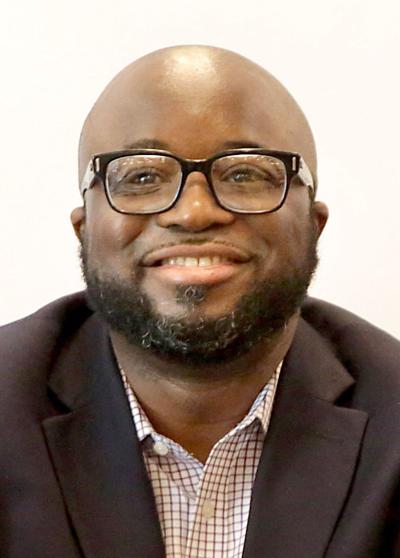ST. LOUIS — The former chief executive of the region’s lead refugee and immigrant resettlement agency said Tuesday that he left the nonprofit over disagreements with the governing board over its long-term goals.
Arrey Obenson, recent president and CEO of the International Institute of St. Louis, said he broadened the agency’s mission to include attracting a “second wave” of migration from other U.S. cities to St. Louis, to help offset population loss and support the region’s vitality. That required breaking a reliance on federal grant funding and creating new programs through support from private donations.
“We were taking it from looking inwards to itself and just being a service provider, to one that was more community focused, one that was providing a much needed solution to the broader St. Louis community,” he said in an interview Tuesday.
He declined to provide specifics but said he resigned Dec. 6 after he realized a “misalignment” between his and the board’s visions for the agency.
People are also reading…
“I thought that it was time to go separate ways and let the organization continue to do the valuable work that it has been doing and will continue to do, and let this vision that I have, not just for one organization, but for the St Louis community, flourish elsewhere,” he said.
The Institute on Tuesday did not address Obenson’s departure but said it has a long-term strategy to achieve its mission, which includes programs started under Obenson. The agency said it will conduct a national search for a new CEO.
“Everyone who is a part of the International Institute is committed to the mission of providing opportunities to immigrants and refugees to thrive in order to create a welcoming, prosperous, and healthy region for all,” spokeswoman Krissy Durant said.
The Institute, a nonprofit established in 1919, has long been the main organization in the region receiving federal funding to support refugees sent here by federal resettlement agencies. Obenson in 2021 succeeded longtime president and CEO, Anna Crosslin, who had headed the agency since 1978.
The Institute said last week that Obenson stopped serving as CEO on Dec. 6, but did not release more details. Employees were notified by email of his departure but were not provided more information, and sources close to the agency said Obenson was removed by the board after a closed-door meeting.
Obenson on Tuesday said he would continue to support and advocate for the Institute’s programs and mission.
As CEO, he thought the nonprofit previously was simply waiting each year to settle specific numbers of refugees sent to St. Louis, but federal funding can be unreliable, depending on support from presidential administrations.
He aimed to garner more community financial support to attract more migrants here to boost the region’s population and economy, an effort local leaders credited this year with making St. Louis the city with the fastest-growing foreign-born population.
“There is a need for us to think beyond the federal programs and being dependent on grants from year to year,” he said.
Under Obenson, the Institute grew from serving about 1,200 people in 2021, with an $8.5 million budget, to serving about 4,600 in 2024, with a budget of $26 million.
The Institute’s revenues grew from $12 million in 2021 to $24.7 million in 2023. And about 70% of the agency’s funding in 2024 came from federal grant programs, down from more than 90% in previous years, Obenson said.
The agency created the Afghan and Latino outreach programs, inspired in part by the success of a wave of Bosnian immigrants and refugees in the 1990s. They drew second-wave migrations of those groups from other U.S. cities with job training and educational classes, housing and entrepreneurship grants and other incentives.
The programs, supported by private donations, drew more than 1,500 Afghan refugees to St. Louis since 2021 and more than 300 people who immigrated to the U.S. under a “humanitarian parole” program limited to Cuba, Venezuela, Nicaragua and Haiti.
The Institute also made “bold” investments, Obenson said, like spending more to grow the Festival of Nations, and securing a donation of 23 apartments in Soulard to house people or use to generate revenue for the Institute.
But with that growth came growing expenses. An audit published in June found the Institute lost $2.4 million in net assets in 2023. Obenson insisted the Institute’s long-term finances were healthy, noting the agency paid off a longstanding debt on its main offices and recently secured donation of $1.2 million in funding over the next five years.
“If you’re not investing in the organization than you’re not building capacity for the future,” he said.
View life in St. Louis through the Post-Dispatch photographers' lenses. Edited by Jenna Jones.

















